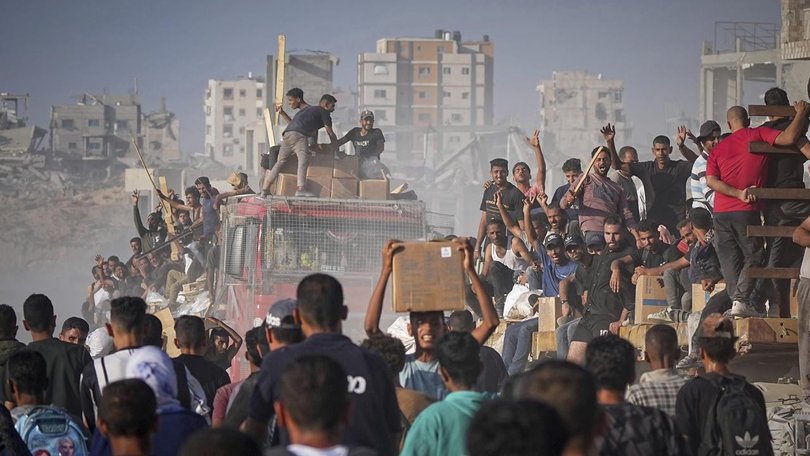Israel, Gaza war: Israeli attacks kill 140 in Gaza Strip within 24 hours, local health officials say
Some Palestinians in the enclave say their plight is being forgotten as attention has shifted to the air war between Israel and Iran.

Israeli gunfire and strikes have killed at least 140 people across the Gaza Strip in the past 24 hours, local health officials say, as some Palestinians in the enclave say their plight is being forgotten as attention has shifted to the air war between Israel and Iran.
At least 40 of those killed over the past day died as a result of Israeli gunfire and air strikes on Wednesday, Gaza’s health ministry said.
The deaths included the latest in near daily killings of Palestinians seeking aid in the three weeks since Israel partially lifted a total blockade on the territory.
Sign up to The Nightly's newsletters.
Get the first look at the digital newspaper, curated daily stories and breaking headlines delivered to your inbox.
By continuing you agree to our Terms and Privacy Policy.Medics said separate air strikes on homes in the Maghazi refugee camp, the Zeitoun neighbourhood and Gaza City killed at least 21 people while five others were killed in an air strike on an encampment in Khan Younis in the south of the strip.
Fourteen more people were killed in Israeli fire at crowds of Palestinians awaiting aid trucks brought in by the United Nations along the Salahuddin road in central Gaza, medics said.
Asked about the Salahuddin road incident, the Israel Defence Forces said that despite repeated warnings that the area was an active combat zone, individuals approached troops operating in the Nuseirat area in the central Gaza Strip in a manner that posed a threat to forces.
Troops fired warning shots, it said, adding that it was unaware of injuries.
Regarding other strikes, the IDF said it was “operating to dismantle Hamas military capabilities” while taking “feasible precautions to mitigate civilian harm”.
On Tuesday, Gaza’s health ministry said 397 Palestinians among those trying to get food aid had been killed and more than 3000 wounded since aid deliveries restarted in late May.
Some in the Gaza Strip expressed concern that the latest escalations in the war between Israel and Hamas that began in October 2023 would be overlooked due to the new Israel-Iran conflict.
“People are being slaughtered in Gaza, day and night, but attention has shifted to the Iran-Israel war. There is little news about Gaza these days,” said Adel, a resident of Gaza City.
“Whoever doesn’t die from Israeli bombs dies from hunger. People risk their lives every day to get food, and they also get killed and their blood smears the sacks of flour they thought they had won,” he told Reuters via a chat app.
Israel is channelling much of the aid into the enclave through a new US- and Israeli-backed group, the Gaza Humanitarian Foundation, which uses private US security and logistics firms and operates a handful of distribution sites in areas guarded by Israeli forces.
Israel has said it will continue to allow aid into the Gaza Strip, home to more than two million people, while ensuring it does not get to Hamas.
Hamas denies seizing aid, saying Israel uses hunger as a weapon.
Philippe Lazzarini, head of the United Nations agency for Palestinian refugees, called the current system for distributing aid a “disgrace & a stain on our collective consciousness” in a post on X on Wednesday.
The Gaza Strip war was triggered when Hamas-led militants attacked Israel in October 2023, killing 1200 and taking about 250 hostages, according to Israeli allies.
Israel’s subsequent military assault has killed nearly 55,600 Palestinians, according to Gaza’s health ministry, displaced almost all the territory’s residents and caused a severe hunger crisis.
The World Food Programme called on Wednesday for a big increase in food distribution in the area, saying that the 9000 metric tons it had dispatched over the last four weeks inside the Gaza Strip represented a “tiny fraction” of what was needed.
“The fear of starvation and desperate need for food is causing large crowds to gather along well-known transport routes, hoping to intercept and access humanitarian supplies while in transit,” the WFP said in a statement.
“Any violence resulting in starving people being killed or injured while seeking life-saving assistance is completely unacceptable,” it added.
